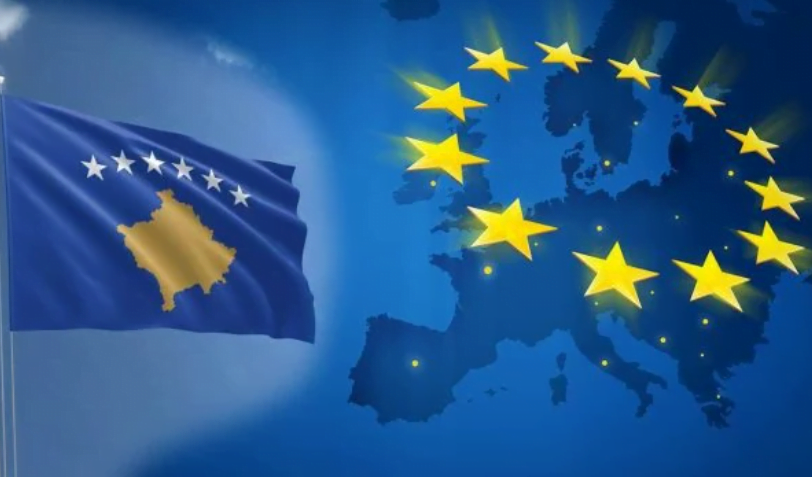The European Union has come close to lifting the restrictive measures against Kosovo, imposed a year ago by the European Commission, as a result of the escalation of the security situation in the north of Kosovo.
In May 2023, tensions in the north of Kosovo culminated after the entry of Albanian mayors into municipal facilities. They emerged from elections that the majority Serb population in North Mitrovica, Zveçan, Leposaviq and Zubin Potok boycotted.
Since not enough votes were secured, the process failed. But, after holding the process, the Government of Kosovo and leaders such as Prime Minister Albin Kurti and President Vjosa Osmani requested that the punitive measures of the EU be removed.
Radio Free Europe learns from some diplomatic sources in the EU that the vast majority of member states are in favor of removing all measures, while a smaller number of states want their removal to be done gradually.
According to these sources, no EU member country has expressed against the lifting of the measures. This impression was observed in the last discussion that took place in the EU on Tuesday night about the current situation in Kosovo. The discussion was held in the Committee for Politics and Security of the EU (PSC) where the ambassadors of the 27 member countries are.
Most of the member countries want all the measures against Kosovo to be removed, but there are some countries, among them the three QUINT countries (Germany, France and Italy), who want the gradual removal of the measures against Kosovo”, he said to Radio Free Europe an EU diplomatic resource.
The same sources have said that the EU External Action Service (EEAS) is in favor of lifting the measures against Kosovo, but until now there has been more hesitation from the European Commission, where the commissioner for neighborhood and expansion, Oliver Varhelyi.
During the last discussions, there was talk about the steps taken by Kosovo to fulfill the conditions for lifting the measures, but also about the steps that, according to the reporters who spoke, have not yet been fully fulfilled. Two EU special envoys, Miroslav Lajçak, as special envoy for dialogue and Tomas Sonyong, who is special envoy for Kosovo and head of the office of the of the EU in Kosovo.
They have said that the situation is still tense and the problems caused in the north have not been overcome even after the opportunity offered to the Serbs in four municipalities in the north to vote for the dismissal of the mayors of these municipalities.
Both of them, according to diplomatic sources, have avoided direct questions about whether Serbia is violating the Agreement on the path towards the normalization of relations with Kosovo by opposing Kosovo’s membership in the Council of Europe.
They have only established that Serbia has engaged in efforts to prevent Kosovo’s membership in the Council of Europe.
During the discussion, according to diplomatic sources, there were calls to remove all measures against Kosovo as soon as possible, because they have created the impression that the EU does not have a balanced approach to Serbia and Kosovo.
Finland, the Baltic countries, Croatia, Poland, Slovenia and several other countries have been the loudest in their demands for the removal of measures against Kosovo. While France, Italy and Germany have wanted to leave the impression that the QUINT countries have a common position and have preferred the gradual lifting of the measures.
Hungary, which until recently was opposed, has now not expressed its opposition.
The member countries have called for the High Representative of the EU for foreign policy and security, Josep Borrell, as soon as possible to report to the Council of the EU on the fulfillment of the conditions by Kosovo for the removal of measures. This report is necessary in order for the measures to be lifted, in whole or in part.
EU sources have said that the conclusions from the meeting of EU ministers from December 12, 2023 mention the “removal of measures” and not the gradual removal as requested by some countries.
“The Council recalls that the EU is ready to remove the measures if further progress is made in fulfilling the requirements. The Council will follow up on the matter and will return to it based on the report of the High Representative for the fulfillment of these requirements”, he wrote in the conclusions of the EU General Affairs Council from December last year.
There is also uncertainty within the EU about the need for member countries to agree on the lifting of measures. This, because when the measures were decided, it was said that “this is the competence of the European Commission”. Now it is required that for their removal there is agreement from all EU member countries. EU sources after the last debate where the readiness of the member states was seen say that “the EU is getting closer to lifting the measures against Kosovo, but it is still not a done deal”.







